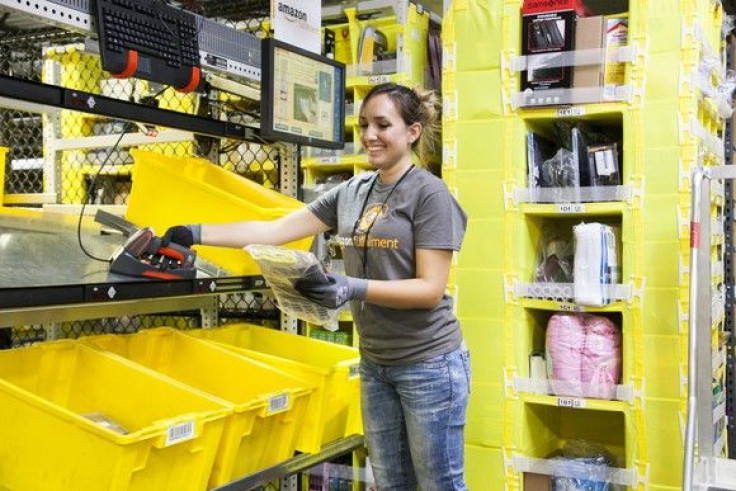How Amazon Is Quietly Entering The Blockchain And Cryptocurrency Boom

This article originally appeared in the Motley Fool.
Since 2017 began, no asset class has been more impressive than cryptocurrencies. The aggregate value of these virtual currencies has soared from $17.7 billion to well over $800 billion at one point nearly three weeks ago. Investors in these cryptocurrencies have been treated to annual gains that would otherwise have taken the stock market decades to deliver.
While there are numerous catalysts that could be pointed to as fueling these gains, including a weaker U.S. dollar and the absence of institutional investors in decentralized cryptocurrency exchanges, it's the rise of blockchain technology that probably deserves the most credit.
The Rise Of Cryptocurrencies Is Really All About The Emergence Of Blockchain
Blockchain, in its simplest form, is the digital, distributed, and decentralized ledger that underpins virtual currencies and records all transactions without the need for a financial intermediary, like a bank. The entire existence of blockchain arose out of the inefficiencies of the current banking system, and it's believed that the financial services industry could benefit most from its implementation.
For example, transactions in the current banking system can take days to settle, especially involving cross-border transactions. With blockchain, proofing and validation are done 24 hours a day, seven days a week. In many cases, transactions are processed and validated in a matter of seconds or minutes, including those that are cross-border.
Blockchain may also resolve what are perceived to be high transaction costs associated with processing transmittances. Blockchain works around banks, thus cutting them out of the equation. Without this third-party provider putting their hand in the cookie jar, so to speak, transaction fees are expected to be smaller.
It's also worth noting that blockchain has applications well beyond the financial services industry. It can be used by the energy sector to expedite the settlement of energy futures, by the tech sector to manage networks and determine whether devices are trustworthy, and by the retail and logistics industry to manage supply chains. This is just a fraction of its potential.
Thus, it should come as little surprise that some of the biggest companies in the world (and tech sector) are investing time and money into blockchain and cryptocurrency usage.

Big Brand-Name Companies Are Developing Blockchain Solutions
For example, even though Dow component IBM (NYSE:IBM) was late to the party during the cloud computing revolution, it's been on the leading edge of blockchain development. In October, it announced a partnership that'll see Stellar's blockchain deployed by a dozen large banks in the South Pacific region. Since IBM generates tens of billions of dollars in annual business outside the U.S., it's believed this blockchain partnership could allow payments from its customers in the South Pacific to settle in a matter of seconds, as opposed to waiting days for those payments to clear.
What's more, IBM also announced a partnership with shipping giant Maersk that'll have the two forming a joint venture to continue developing shipping and supply chain management blockchain solutions. IBM and Maersk actually formed a blockchain partnership back in 2016, but only recently came to announce the intent to form a joint venture so as to allow their blockchain solutions to develop in a start-up-like environment.
Similarly, Microsoft (NASDAQ:MSFT) has been more than willing to invest time and money into the possible applications of blockchain on its cloud platform, Azure. In addition to the financial industry, Microsoft's blockchain aims to lure in healthcare providers and retailers. The legally binding nature of digital records via blockchain is particularly appealing to the healthcare sector, and Microsoft is hoping to capitalize on that.

You're Not Fooling Anyone, Amazon
Surprisingly, though, one megacompany notably absent from the blockchain revolution (so it would seem) is Amazon.com (NASDAQ:AMZN) . Despite being a retail kingpin and a major cloud player via Amazon Web Services (AWS), Amazon has kept its distance from blockchain and other tech trends that might be thought of as faddish.
In November, at the annual re:Invent conference in Las Vegas, Nevada, AWS CEO Andy Jassy cooled investors' jets by announcing that AWS wouldn't be offering any blockchain-based services anytime soon. To summarize, Jassy claimed that there were limited use cases for blockchain, and that the distributed ledgers currently available had limited capabilities. He also reinforced a previous thesis with Amazon that it doesn't "build technology because we think it is cool."
But you're not fooling anyone, Amazon. In fact, Amazon might as well be the business equivalent of Bill Belichick, coach of the National Football League's New England Patriots. This year marks the eighth time since 2001 Belichick has led the Patriots to the Super Bowl. Regardless of the situation, Belichick's expressions tend to be stoic, yet he's always calculating in his demeanor and searching for a way to get the upper hand on his opponent -- much in the way Amazon has slow-played its entrance into a variety of industries only to surprise its competition and blow them out of the water.
Amazon Announces Its Subtle Entrance Into Blockchain
Despite effectively crushing the rumors of blockchain enthusiasts in November, just a month later, AWS announced that it was investing in blockchain through a partner ecosystem. The AWS Blockchain Partners Portal is designed to support the integration of blockchain solutions within the existence of AWS. The press release goes on to state that AWS Blockchain Competency is expected to launch this year, and notes a series of one-click deployable solutions already available, including Sawtooth Supply Chain, Sawtooth 1.0, R3 Corda, PokitDok, and Blockapps Strato.
What Amazon is offering sounds similar to that of Microsoft, but AWS appears to be letting customers play a more prominent role in guiding the adoption of blockchain solutions, rather than putting a product out and expecting the consumer to use it, as most cryptocurrencies and blockchain developers have chosen to do.
Not to mention that Amazon also fairly recently registered the following three domain names: amazonthereum.com, amazoncryptocurreny.com, and amazoncryptocurrencies.com. It also registered amazonbitcoin.com back in 2014, according to CoinDesk. These registrations may simply be a tactic to protect the Amazon name from entrepreneurs. Then again, it could be a precursor to its push deeper into the cryptocurrency and blockchain space.
Amazon certainly has the deep pockets and the cloud infrastructure to make the integration of blockchain relatively seamless, should it decide to go that route.
The AWS CEO Does Bring Up One Very Valid Point
However, as surprisingly good as Amazon is at playing it cool and then going "full Belichick" to throttle its competition, Andy Jassy does raise a good point: Blockchain is largely untested.
Blockchain technology has certainly received the spotlight over the past year, but we have to remember that it's been around for about a decade, and only recently has it been pushed into demos and small-scale projects. Investors are notorious for overestimating how quickly new technology will be adopted en masse by the business community, and the rise of blockchain may have led to yet another of many bubbles created by investors' unrealistic expectations.
For example, we really don't have a very good idea of what blockchain networks are capable of when fully scaled. Bitcoin is the most popular cryptocurrency in the world, and its network is bogged down by slow transaction speeds. It's possible this fate could be shared by other blockchain networks as they're ramped up, making them less attractive than initially thought.
A more likely scenario is that it's going to take many more years of development and refinement before blockchain has any chance of becoming truly mainstream. But I'd presume that if and when it does become a needle-mover, Amazon and AWS will be in the mix.
Bitcoin is overhyped: 10 better buys for you now
When investing geniuses David and Tom Gardner have a stock tip, it can pay to listen. After all, the newsletter they have run for over a decade, Motley Fool Stock Advisor, has tripled the market.*
David and Tom just revealed what they believe are the ten best stocks for investors to buy right now... and investing directly in Bitcoin was noticeably absent from their recommendations! That's right -- they think these 10 stocks are better buys.
John Mackey, CEO of Whole Foods Market, an Amazon subsidiary, is a member of The Motley Fool's board of directors. Teresa Kersten is an employee of LinkedIn and is a member of The Motley Fool's board of directors. LinkedIn is owned by Microsoft. Sean Williams has no position in any of the stocks or cryptocurrencies mentioned. The Motley Fool owns shares of and recommends Amazon. The Motley Fool has a disclosure policy.











